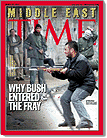
Three Years On: Rallying in support of Arafat at a Gaza refugee camp
Barghouti, whose "Tanzim" militia, and their al-Aqsa Martyr's Brigade offshoot, have been at the heart of Palestinian armed actions against Israel over the past three years, is a leading candidate to eventually succeed Yasser Arafat as national leader of the Palestinians. He did not bother to answer the charges against him, dismissing the court's right to even try a non-citizen such as himself. Instead, he delivered his own indictment of Israel's occupation of the West Bank and Gaza, reiterated his pride in the intifada, and warned that if Israel was not prepared to move quickly to a two-state solution it would have to find a way to live with a Palestinian majority in a single state.
There also seemed to be a message for President Bush in Barghouti's address, when he warned that "a man cannot be a Palestinian leader if he does not fight the occupation." The Bush administration has made sidelining Arafat a key precondition for any resumption of talks, but Barghouti insisted that even if Arafat was removed, the only Palestinians with the credibility to lead — and to put a stop to Palestinian violence — are those who have taken an active part in the Palestinian struggle. He should know. Despite being incarcerated in Israel, Barghouti is widely credited with having played a leading role in orchestrating the 45-day cease-fire among Palestinian groups, which collapsed last month in a wave of Palestinian terror attacks and Israeli assassinations.
Israelis aren't much interested in what Barghouti has to say anyway. Their priorities are protecting themselves from terror attacks and surviving in an economy wheezing under the burden of three years of a war for which they hold Barghouti as second only to Arafat in culpability. Their focus is not on negotiations but on building a wall that will separate them from the Palestinian areas on the West Bank that produce most of the suicide bombers attacking Israel. Despite U.S. concerns that the wall may create a de facto border deep inside the West Bank that would imperil prospects for achieving agreement on a two-state separation, the government of Prime Minister Ariel Sharon affirmed its intention Wednesday, to press ahead with the next phase of the project. The only concession to Washington's concerns was the decision to leave a gap between two strands of fence around the settlement of Ariel, 12 miles inside the West Bank. The gap will, no doubt be closed at a more opportune time — which Hamas or one of the other Palestinian militant groups will no doubt obligingly provide in the form of some new terrorist carnage in an Israeli city.
The tally of three bloody years
|
|
||
|
|
 March 25, 2002  April 8, 2002  Oct. 23, 2000 |
|
|
|
||
|
|
|
|
|
|
||
Three years into the intifada, the violent stalemate persists. For Israel, some months are bloodier; others are comparatively quiet — but that is always short-lived, the certainty ever-present that more terror will come despite the best efforts of Israel's security forces. For the Palestinians, too, some months are worse than others, but even in times of relative calm there is the strangulation of social and economic life resulting from the occupation and its security measures. The Israeli economy is in decline; the Palestinian economy has all but ceased to function, leaving upward of 60 percent of the population living below the poverty line. Worse news, for both sides, is that there is no visible prospect for the foreseeable future of breaking the malignant impasse.
The U.S. and Israel insist that the Palestinians sideline Arafat, and warn that they'll work with the new government of Prime Minister Ahmed Qureia only if it goes to war with Hamas, Islamic Jihad and the al-Aqsa Martyr's Brigade. But Qureia has already warned that the insistence on dispatching Arafat, who remains the elected leader of the Palestinians, will imperil any prospects for progress. Nor is he any more likely than his predecessor, the hapless Mahmoud Abbas, to seek confrontation with the militant groups. Like his predecessor, he will seek a truce by consensus among the Palestinian factions.
Many Palestinian leaders — not only those around Abbas, but also many of those around Qureia — believe the three-year armed intifadeh has been a tragic mistake that has taken the Palestinian cause to the brink of a defeat every bit as catastrophic for their people as their expulsion from Israel in 1948 and the defeat of the Arab armies in 1967 that saw Israel take control of the West Bank and Gaza. In the opening months of the current intifada, when Palestinians died in far higher numbers as they confronted occupation forces with stones or rifles, international opinion was solidly behind the Palestinians and Israel was isolated. But within six months, the signature tactic of the "armed intifada" had become suicide terror inside Israel's cities, and that profoundly changed the dynamic — on the one hand, it brought the Israeli casualty figure far closer to the Palestinian equivalent, satisfying a hunger for vengeance among Palestinians, but at a heavy political price. Some of the militants had hoped that the rising death toll would provoke a crisis in Israel and force a withdrawal from the West Bank in the same way that Hezbollah's 20-year war of attrition had eventually forced Israel to quit southern Lebanon. Instead, the wave of terror dealt a mortal blow to the Israeli peace camp, propelling Ariel Sharon — a hard-line opponent of the peace process — from the political margins to the office of Prime Minister, ending all further discussions on a final-status deal to complete the Oslo process.
Under Sharon's stewardship, Israel's focus became achieving a military victory over the Palestinian uprising. Sharon would achieve peace, he promised Israelis, by lowering Palestinian expectations and rendering unbearable the cost of rebellion. But even as Sharon piled on the collective punishment of the Palestinian population, the suicide bombings provoked such international revulsion that the Palestinians found themselves in diplomatic free fall, plummeting even faster following the September 11 attacks. Suicide bombings played into Sharon's hands, allowing him to define the conflict between Israel and the Palestinians as first and foremost an issue of terrorism, which had become the prism through which the Bush administration was inclined to view the world. And where the administration had started out emphasizing a link between achieving a cease-fire and resuming political negotiations — on the grounds that without a "political horizon" for ending it, the occupation itself would continue to generate violence — the suicide terror attacks helped Sharon persuade Washington to adopt his own position that there could be no talks about ending the occupation before Palestinian violence was ended.
